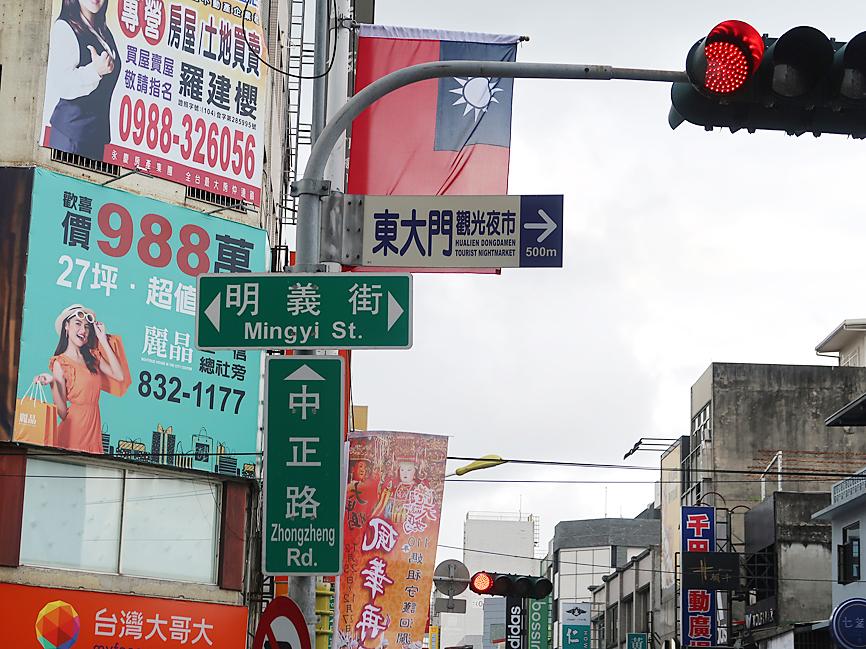More than 350 streets are named after Chiang Kai-shek (蔣介石) or his son Chiang Ching-kuo (蔣經國), due to an edict issued during the nation’s authoritarian era, a study by the Transitional Justice Commission showed.
The survey of the Ministry of the Interior’s records of road names, online search engines and archival material found that 316 roads are named “Jhongjheng” (中正), a name adopted by Chiang Kai-shek, the commission said.
Twenty-eight roads are named “Jieshou” (介壽) — which is an abbreviation of the slogan “long live Chiang Kai-shek” — and 11 are named “Jingguo” (經國) after Chiang Ching-kuo, it added.

Photo: Chen Yu-fu, Taipei Times
The survey was conducted as part of an effort to rename roads that evoke authoritarian slogans and symbols, it said.
The proliferation of streets named after the Chiangs stemmed from a 1945 executive order to rename roads throughout Taiwan, which the then-Chinese Nationalist Party (KMT) regime had taken control of, it said.
The order from the then-Taiwan Provincial Government said that all street names honoring Japanese, the state of Japan or otherwise derived from Japanese were to be changed within two months, the commission said.
The new street names had to represent the “spirit of the Chinese people,” promote the Three Principles of the People, honor a national hero or recognize the geography or customs of an area, the commission cited the order as saying.
Examples of acceptable street names listed in the order included Jhonghua (中華), Sinyi (信義), Heping (和平), Sanmin (三民) and those that utilize the names of Chiang Kai-shek or Republic of China founder Sun Yat-sen (孫逸仙), it said.
The implementation of the order in the two years that followed would form the basis of most street names used today, the commission said.
The post-war push to rename streets was motivated by a desire to replace representations of Japanese colonialism with symbols of Chinese authoritarianism, an effort that was indifferent to the identities and culture of Taiwan’s residents, it said.
Place names play an important role in forming the identity of the community living there, and reflect its cultural and historical context, the commission said, adding that the authoritarian-era names should be replaced.
Citing the Development of National Languages Act (國家語言發展法) and the Indigenous Peoples Basic Act (原住民族基本法), the commission said that new road names should promote the country’s local languages and culture, including those of Aboriginal communities.

‘DENIAL DEFENSE’: The US would increase its military presence with uncrewed ships, and submarines, while boosting defense in the Indo-Pacific, a Pete Hegseth memo said The US is reorienting its military strategy to focus primarily on deterring a potential Chinese invasion of Taiwan, a memo signed by US Secretary of Defense Pete Hegseth showed. The memo also called on Taiwan to increase its defense spending. The document, known as the “Interim National Defense Strategic Guidance,” was distributed this month and detailed the national defense plans of US President Donald Trump’s administration, an article in the Washington Post said on Saturday. It outlines how the US can prepare for a potential war with China and defend itself from threats in the “near abroad,” including Greenland and the Panama

The Chinese Nationalist Party (KMT) is maintaining close ties with Beijing, the Democratic Progressive Party (DPP) said yesterday, hours after a new round of Chinese military drills in the Taiwan Strait began. Political parties in a democracy have a responsibility to be loyal to the nation and defend its sovereignty, DPP spokesman Justin Wu (吳崢) told a news conference in Taipei. His comments came hours after Beijing announced via Chinese state media that the Chinese People’s Liberation Army’s Eastern Theater Command was holding large-scale drills simulating a multi-pronged attack on Taiwan. Contrary to the KMT’s claims that it is staunchly anti-communist, KMT Deputy

RESPONSE: The government would investigate incidents of Taiwanese entertainers in China promoting CCP propaganda online in contravention of the law, the source said Taiwanese entertainers living in China who are found to have contravened cross-strait regulations or collaborated with the Chinese Communist Party (CCP) could be subject to fines, a source said on Sunday. Several Taiwanese entertainers have posted on the social media platform Sina Weibo saying that Taiwan “must be returned” to China, and sharing news articles from Chinese state media. In response, the Mainland Affairs Council (MAC) has asked the Ministry of Culture to investigate whether the entertainers had contravened any laws, and asked for them to be questioned upon their return to Taiwan, an official familiar with the matter said. To curb repeated

Myanmar has turned down an offer of assistance from Taiwanese search-and-rescue teams after a magnitude 7.7 earthquake struck the nation on Friday last week, saying other international aid is sufficient, the National Fire Agency said yesterday. More than 1,700 have been killed and 3,400 injured in the quake that struck near the central Myanmar city of Mandalay early on Friday afternoon, followed minutes later by a magnitude 6.7 aftershock. Worldwide, 13 international search-and-rescue teams have been deployed, with another 13 teams mobilizing, the agency said. Taiwan’s search-and-rescue teams were on standby, but have since been told to stand down, as